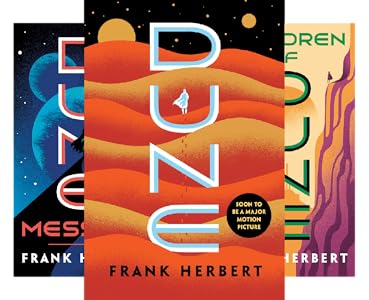
![]() Children of Dune by Frank Herbert
Children of Dune by Frank Herbert
Based on the polar nature of the first two books in the DUNE series, Paul’s ascension in Dune and his descent in Dune Messiah, not much would seem left to be told in the House Atreides saga. Publishing Children of Dune in 1976, ten years after Dune, Frank Herbert proved there was still more to tell, telling a solid but not spectacular tale that has some big shoes to fill if it is to live up to the success of Dune.
With Paul having been cast blind into the desert at the conclusion of Dune Messiah, Children of Dune opens roughly a decade later with Alia on the throne and caring for Paul and Chani’s twins, Leto II and Ghanima. Fearing she is an abomination due to the ghost of Baron Harkonnen living inside of her, Alia’s psychological stability takes blow after blow, a fact not helped by the re-emergence of Paul’s mother, the Benne-Gesserit Lady Jessica, at court. Arrakis terraforming continuing apace, the desert is being reclaimed, the planet greener by the day. Leto, realizing the threat this represents to the sandworms, goes into the desert in an attempt to save the spice producing beasts, leaving his family behind in the process. Topping all of this, House Corinno once again plots to retake the throne, nobody knowing how the chaos in the works will turn out in the end.
Much of Children of Dune’s plot centers on Leto II and Ghanima and their struggles to survive in the politically and religiously tumultuous situation on Arrakis. Herbert is back in heavy-handed form; the ideological philosophizing that was such a prominent feature of Dune Messiah returns, turning the twins’ story and the events surrounding them into a harsh exposition on power. Herbert achieves a finer balance this time around, however — the narrative also includes a larger amount of storytelling and the book reads better for it. Despite that much feels contrived and melodramatic — the Corinno assassination attempt on the twins, especially — this book is more readable than Dune Messiah.
 In addition to the jagged dialogue on politics and religion, additional problems reveal themselves in Children of Dune, predominantly plot holes. The leviathan that Herbert unleashed in Dune is beginning to show signs of strain as he attempts to expand the setting while reusing earlier story arcs. As such, the overall resolution to character storylines will satisfy many, but the manner of their making will leave some readers with furrowed brows. One reason is the fantasy aspects. Prescience, soul-reading, pre-destination, shapeshifting, spice, possession (as in, by spirits), etc. are an interesting bag, but one that is not always mixed consistently. Sometimes (not always) they overlap and interfere with one another. When does prescience become destiny, or vice versa? Why weren’t shapeshifters involved or affecting other matters? How could no one have foreseen what Leto discovers in the desert?
In addition to the jagged dialogue on politics and religion, additional problems reveal themselves in Children of Dune, predominantly plot holes. The leviathan that Herbert unleashed in Dune is beginning to show signs of strain as he attempts to expand the setting while reusing earlier story arcs. As such, the overall resolution to character storylines will satisfy many, but the manner of their making will leave some readers with furrowed brows. One reason is the fantasy aspects. Prescience, soul-reading, pre-destination, shapeshifting, spice, possession (as in, by spirits), etc. are an interesting bag, but one that is not always mixed consistently. Sometimes (not always) they overlap and interfere with one another. When does prescience become destiny, or vice versa? Why weren’t shapeshifters involved or affecting other matters? How could no one have foreseen what Leto discovers in the desert?
Another reason is character motivation. Events, particularly toward the conclusion, fly fast, changing the status of people and the political situation left and right. But these changes don’t always seem to have a natural flow to them. For example, when one character suddenly requests another to kill them, it seems that Herbert needs the character out of the way more than the character wants to die. Forgiving fans will not make a big fuss about these elements — story, after all, is story, and fantasy, fantasy. But readers requiring more plausibility motivating the plot will find something to be desired.
In the end, Children of Dune is a solid addition to the DUNE series that takes the overall story to the next level. The storytelling is not as strong as it was in Dune and readers should expect a plot more complex than the first two books, and one which may or may not always add up. Herbert continues his podium stand, injecting dialogue with maxims and epigraphical statements on the lows and highs of society and power. It achieving a better balance between principle and story this time around, however, and fans of the books — emphasis on the plural — will find the novel a good addition, while those who hoped Dune Messiah to be only a temporary dip in quality will not be impressed; Children of Dune is not a return to Dune’s standard. If epic sagas in space are your game, then the DUNE series should be high on your to-read list. If more subtle examinations of the great beyond are your preference, Children of Dune will not satisfy.



Agree! And a perfect ending, too.
I may be embarrassing myself by repeating something I already posted here, but Thomas Pynchon has a new novel scheduled…
[…] Tales (Fantasy Literature): John Martin Leahy was born in Washington State in 1886 and, during his five-year career as…
so you're saying I should read it? :)
As a native New Yorker, I love the idea of the city being filled with canals and no skyscrapers! And…